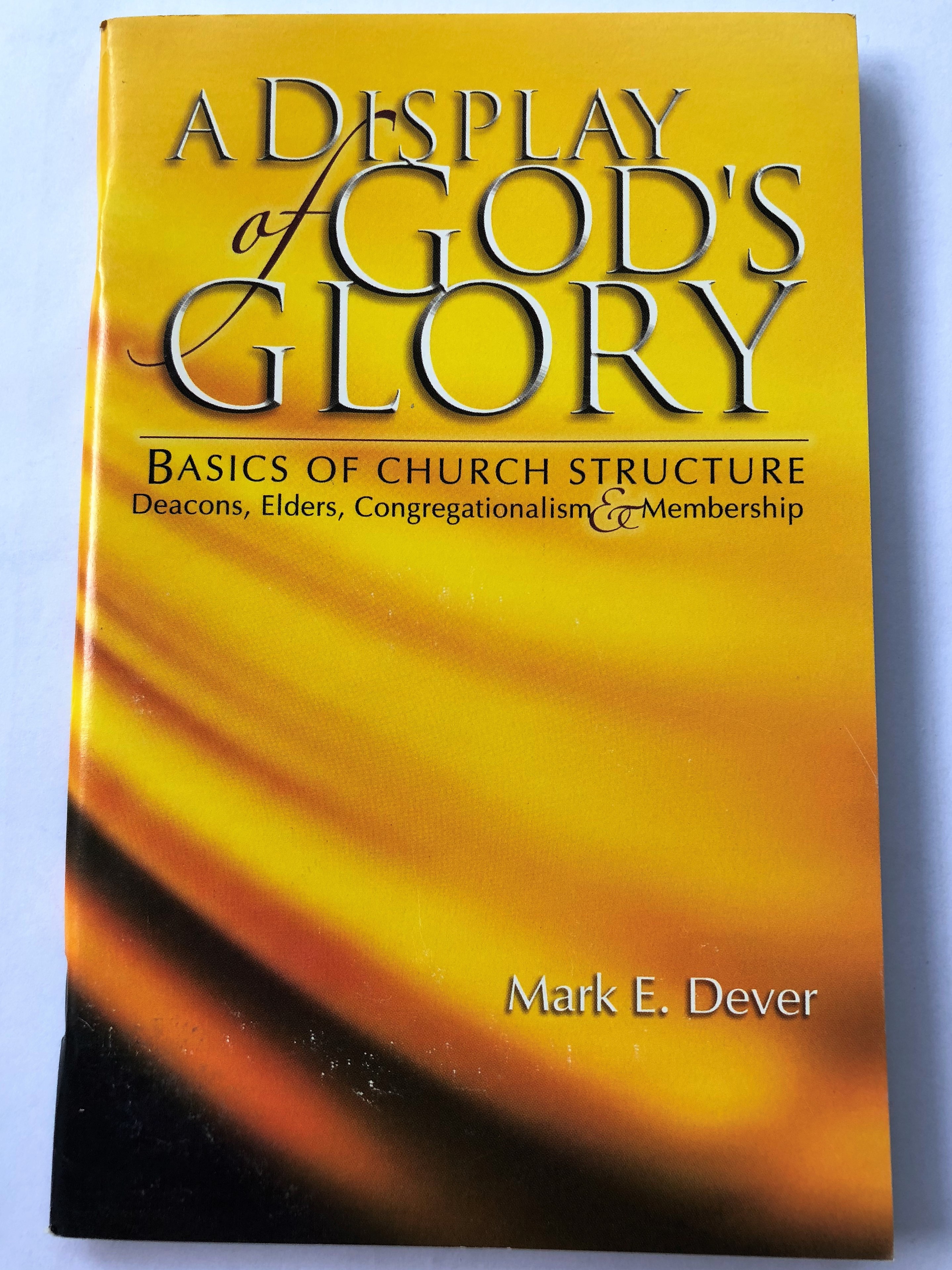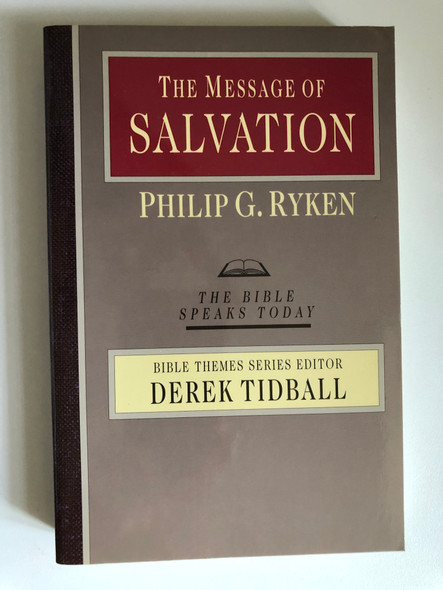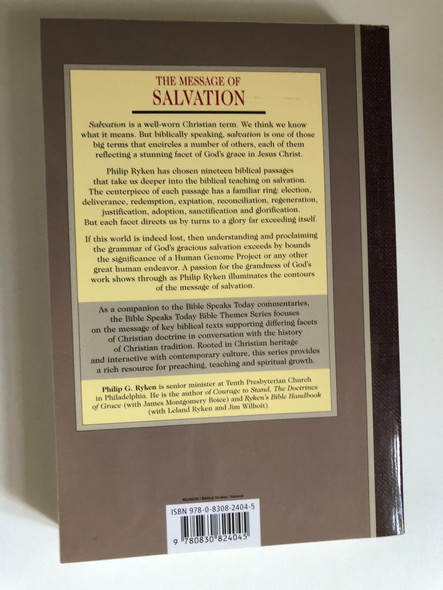A Display of God's Glory By Mark E. Dever
UPC: 9780970125224
Overview
A Display of God's Glory by Mark E. Dever offers a concise and powerful guide to biblical church leadership. Drawing from Scripture, Dever outlines a blueprint for establishing a leadership structure that fosters peace and unity within the church, while remaining resilient under the pressures of modern organizational challenges. This book is an essential resource for pastors, church leaders, and members seeking to understand and implement a biblical model of governance that honors God and strengthens His church.
Product Features
- Format: Paperback
- Length: 84 pages
- Publisher: 9Marks (January 1, 2001)
- Language: English
- ISBN-10: 0970125224
- ISBN-13: 978-0970125224 / 9780970125224
- Dimensions: 5.5 x 0.2 x 8.5 inches
- Shipping Weight: 3.2 ounces
Interesting Facts
-
About the Author:
Mark E. Dever is the senior pastor of Capitol Hill Baptist Church in Washington, D.C., and the president of 9Marks Ministries. Known for his focus on building healthy churches, Dever is a respected theologian, pastor, and author, committed to helping churches align their leadership and practices with biblical principles.
-
Focus on Church Leadership:
This book emphasizes a biblical approach to church leadership, addressing key areas such as the roles of elders, deacons, and the congregation. Dever provides practical insights for creating a leadership structure that reflects God’s design for the church.
-
Practical and Accessible:
With just 84 pages, A Display of God's Glory is a concise and accessible guide, making it ideal for busy pastors, leadership teams, and church members who want to quickly gain a clear understanding of biblical governance.
-
Foundation for Healthy Churches:
Published by 9Marks, a ministry dedicated to promoting healthy church practices, this book is part of a broader effort to equip churches to glorify God through sound doctrine and leadership.
-
Timeless Blueprint:
Dever’s approach provides a timeless framework for navigating the complexities of leadership in a way that fosters unity, avoids corporate pitfalls, and focuses on God’s glory.
Publishers
- Publisher: 9Marks
- Publishing Date: January 1, 2001
We value your feedback! Share your experience with this product to help others make informed decisions. Your review is important to us!
#MarkDever #ADisplayOfGodsGlory #ChurchLeadership #9MarksMinistries #ChristianBooks #HealthyChurches #BiblicalLeadership #FaithAndDoctrine #Elders #Deacons #SpiritualGrowth


Mark Dever has preached and practiced proper polity for many years. As pastor of Capital Hill Baptist Church and author of multiple books, Dever has often argued that proper church structure is more than an issue of preference. In A Display of God's Glory, we find one of Dever's simplest works dealing with issues of elders, deacons, congregationalism, and church membership
Positives
This book is short, simple, and to-the-point. Dever argues clearly that churches should have a plurality of elders who oversee a congregational church government structure. He clearly articulates that the office of deacon is an office of service rather than authority. Dever also helps us to see why it is important that individuals take church membership seriously.
A few quotes might help to show some of the solid teaching that Dever shares in this tiny work. Dever argues that deacons are to be supporters and defenders of church unity when he writes:
Edifying and uniting the church is especially the ministry of the deacons as we see it in Acts 6. Therefore, we cannot have people serve us well as deacons who are unhappy with the church. The deacons are not those in the church who are complaining the loudest or jarring the church with their actions or attitudes. Quite the opposite! The deacons are to be the mufflers, the shock-absorbers (14).
Dever points to the role of elders in a church as one of both teaching and character by stating, "It seems that the role of the elders is fundamentally to lead God's people by teaching God's Word. This teaching must be by the public handling of God's Word and also by the exemplary lives they lead" (25). Unlike some who present elders in a church and exclude congregationalism, Dever argues that the congregation is the final earthly protector of the gospel when he asks, "Could it be that the gospel itself is so simple and clear, and the relationship that we have with God by the Holy Spirit's action in giving us the new birth is so real that the collection of those who believe the gospel and who know God are simply the best guardians of that gospel" (42)? And the author challenges churches to avoid false messages and confusion by taking membership very seriously when he writes, "Uninvolved "members" confuse both real members and non-Christians about what it means to be a Christian. And we "active" members do the voluntarily "inactive" members no service when we allow them to remain members of the church; for membership is the church's corporate endorsement of a person's salvation" (58).
Negatives
The weaknesses of this book are attributable to the shortness of the work. The author simply does not have enough pages in this book to prove every point he wants to make. He also makes at least one weak argument by failing to go deep in his addressing of the question of whether or not a body of elders should have one lead pastor over it. Dever addresses that point, but, he cannot make a satisfactory argument around it.
Conclusion
I wholeheartedly recommend A Display of God's Glory to any church member interested in how the church should be structured. This would be a great starting point for churches that are considering eldership, biblical deacon roles, or membership issues. It is short, clear, and highly readable besides being solid in what it presents.
















![God of Life [Accompanyment CD] [Audio CD] Mark Schultz God of Life [Accompanyment CD] [Audio CD] Mark Schultz](https://cdn11.bigcommerce.com/s-62bdpkt7pb/images/stencil/590x590/products/3095/6429/1__27718.1462823298.JPG?c=2)





